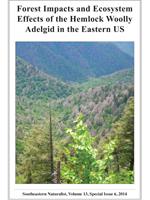Populations of Tsuga canadensis (Eastern Hemlock) and Tsuga caroliniana (Carolina Hemlock) are declining due to infestation by Adelges tsugae (Hemlock Woolly Adelgid), an exotic insect pest. A better understanding of the environmental conditions required for seed germination is needed to more efficiently utilize the seeds collected for genetic-resource conservation and the establishment of seed orchards. This study examined the effect of cold—moist stratification treatments of varying duration (0, 1, 15, 30, 60, 90, and 120 days) on total germination (%) and the number of days to first and peak germination (germination speed) on seeds of both species in experiments conducted at 22 °C and 16 h:8 h, light:dark photoperiod. Overall total germination for Eastern Hemlock was 33.3% and increased with increasing duration of the stratification treatments. Carolina Hemlock total germination was 17.1% and varied little among the treatments, although fewer seeds tended to germinate following longer durations of stratification. Stratification increased germination speed of Eastern Hemlock but not Carolina Hemlock. The results indicate that Eastern Hemlock seeds should be cold—moist stratified at 4 °C for at least 30–60 days prior to sowing to promote higher total germination. Carolina Hemlock seeds can be sown directly following a 24-h soak with no additional cold—moist stratification.
How to translate text using browser tools
1 January 2014
Evaluation of Cold—Moist Stratification Treatments for Germinating Eastern and Carolina Hemlock Seeds for ex Situ Gene Conservation
Robert M. Jetton,
W. Andrew Whittier,
William S. Dvorak
ACCESS THE FULL ARTICLE

Southeastern Naturalist
Vol. 13 • No. 6
July 2014
Vol. 13 • No. 6
July 2014




